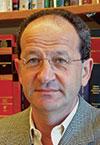The Thoughts Read 'Round the World
The Thoughts Read 'Round the World
Media Contact: Public Affairs, 212-854-2650 or [email protected]
New York, Oct. 25, 2012—Professor Andrzej Rapaczynski’s office in Columbia Law School’s Jerome Greene Hall looks much like the office of any other prolific scholar. It has a large desk covered with papers, a comfortable couch, and an entire wall of shelves filled with books (including some Rapaczynski wrote himself).
But Rapaczynski isn’t just a law professor. He’s also a co-founder of Project Syndicate, one of the world’s foremost publishers of commentary and analysis by distinguished economic, political, and cultural experts. The service, which Rapaczynski helped found more than 15 years ago, counts among its regular contributors a roster of leading intellectual and political thinkers who write about myriad issues from around the globe.
|
|
| Professor Andrzej Rapaczynski |
Readers of nearly 500 newspapers in 153 countries turn to Project Syndicate for cutting-edge commentary from the likes of President Jimmy Carter, former Secretary-General of the United Nations Kofi A. Annan, head of U.N. Women and former president of Chile Michelle Bachelet, and former German Chancellor Helmut Kohl. George Soros, the renowned financier and friend of Rapaczynski’s whose early financial support helped get Project Syndicate off the ground, also writes regularly.
Most of the newspapers that carry Project Syndicate pieces are located outside the United States. But over the last couple of years, Rapaczynski and his team have made a concerted effort to attract more American readers. They overhauled the website to include more discussion, debate and online-only articles, and now about 40 percent of the site’s 1.5 million pageviews a month are from computers in this country.
What readers find when they get to the site is a wide variety of viewpoints from across the political spectrum. Headlines from recently featured columns include: “Hands Off Syria?” “God and Woman in Iran,” and “Back to the Brink for the Eurozone?”
Project Syndicate offers its content in 11 languages to any newspaper, regardless of ability to pay. The subscriptions of larger, more financially stable papers in developed countries help subsidize those of less established content providers in developing countries.
“A huge proportion of our member papers pay nothing or something symbolic,” said Rapaczynski, Daniel G. Ross Professor of Law.
The goal is simple, he said: “To raise the level of political and economic discussions in newspapers and online publications by bringing in more expert opinion. We are taking away from journalists the dominant role of commenting on events.”
To do so, Project Syndicate relies on opinion-makers from around the world—all of whom, despite their brilliance, are “rather heavily” edited, Rapaczynski said with a chuckle.
“Our specialty is to locate the right people and to midwife their thoughts,” he explained. “We help experts express their thoughts, and we help people understand the world around them.”
Project Syndicate writers weigh in from nearly every continent. But Rapaczynski and his colleagues have commissioned content closer to home too, including pieces written by Jeffrey D. Sachs, Director of The Earth Institute at Columbia University; Joseph E. Stiglitz, a Columbia University Nobel Prize-winning professor; Jagdish Bhagwati, a Columbia University Professor; George P. Fletcher, the Cardozo Professor of Jurisprudence at the Law School; and Edmund S. Phelps, another Nobel Prize-winning Columbia professor.
Rapaczynski, and two other co-founders, Roman Frydman, a New York University Professor of Economics, and Kenneth Murphy, a former editor at The Economist, began what would become Project Syndicate in the mid-1990s. The project started as quarterly economic reports distributed to Eastern European newspapers and then evolved into a column syndication service.
Well into their second decade, Rapaczynski, Frydman, and Murphy continue to serve on the project’s editorial board. But though they helped create one of the world’s largest opinion providers, the founders very rarely write for Project Syndicate themselves, preferring instead to bring in outside talent.
That’s fine with Rapaczynski, who has plenty to keep him challenged at the Law School, which he joined in 1982. He teaches torts, antitrust, and constitutional law and also writes on institutional economics and political philosophy. When he’s not working with students or writing for law reviews, Rapaczynski works with Project Syndicate columnists on their pieces.
Besides Rapaczynski’s office in the United States, Project Syndicate also has a Prague office, which handles most of the logistics for the content provider. But the organization is informal and “run on a shoestring,” Rapaczynski said.
Several years ago, he traveled to Prague to celebrate the project’s 10th anniversary. When he got there, he and other staffers realized it was actually their ninth. The distinction hardly mattered. Rapaczynski feels there’s plenty to celebrate. “We think Project Syndicate is the most important source of opinion commentaries in the world,” he said.
# # #
Columbia Law School, founded in 1858, stands at the forefront of legal education and of the law in a global society. Columbia Law School combines traditional strengths in corporate law and financial regulation, international and comparative law, property, contracts, constitutional law, and administrative law with pioneering work in intellectual property, digital technology, tax law and policy, national security, sexuality and gender, and environmental law.
